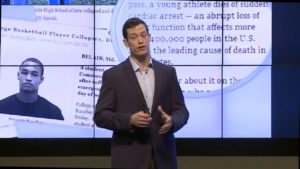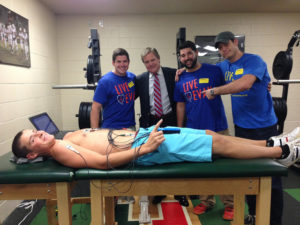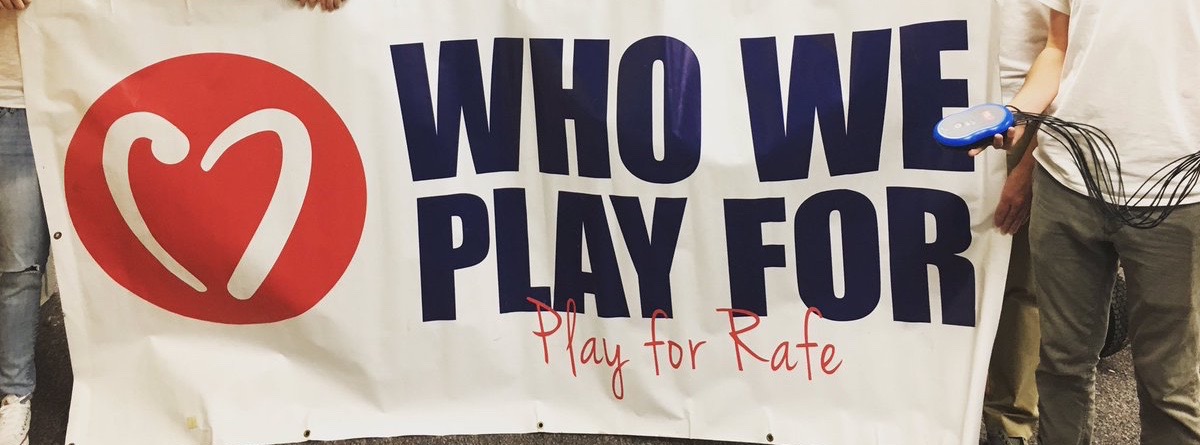“Our story is the story of thousands of teams, communities, and families across the country every single year who lose someone they love to a detectable heart condition,” said Evan Ernst, co-founder of Who We Play For. This unique nonprofit not only provides awareness about the risk that student-athletes have to encountering deadly sudden cardiac arrest, but they also provide electrocardiograms (ECGs) for students in middle, high school, and college to detect those risks before they happen.

Evan told us his story on Episode 22 of the Agents of Innovation podcast. It began in his hometown of Cocoa Beach, Florida. When he was just 16 years old, his friend and soccer teammate, Rafe Maccarone, died of sudden cardiac arrest at the age of 15, just a day after scoring a game-winning goal. At the time, Evan and his teammates were told this was a “lightning strike” incident, perhaps a rare tragedy. But then a few years later Evan and some of his friends moved to Tallahassee to attend Florida State University. While there, they heard numerous stories from incidents like this happening at other high schools. They looked deeper into the matter and discovered this was actually “the leading cause of death in athletes and the leading cause of death on school campuses,” said Ernst.

He then learned that in countries like Italy, Japan, and others, ECGs are administered to all athletes in middle and high school. And, in this country, all Division I colleges and universities, and all major professional sports team, also administer ECGs. With the memory of his friend Rafe in mind, he became personally motivated to ensure that all student-athletes get an ECG — at least once in middle school and once in high school, and also at least once in college for those smaller colleges who don’t yet offer or require an ECG for their athletes.
Majoring in entrepreneurship, business management, and marketing at FSU, Evan came up with an innovative idea to start a nonprofit that would both provide awareness and administer ECGs. He took his idea to the Jim Moran Institute for Global Entrepreneurship at FSU. He then learned of another organization, located in Houston, Texas, the Cypress ECG Project. They were already serving athletes in Texas and a few other states including Louisiana and Washington. They have since merged their efforts to create Who We Play For, with Evan serving as the Executive Director, and expanding efforts all across Florida.

While an ECG typically runs a cost of $150-$300, Who We Play For has found a way to bring those costs down to just $15 per athlete served. They have been able to cut costs through the innovative approach offered through telemedicine.
“Telemedicine – that’s the future,” said Ernst. The staff at Who We Play For was trained by the medical board to go into schools and administer an ECG. They place about 10 stickers on the patient’s chest, record the data, and then send the data to a medical doctor. The doctor can then take about 5 seconds per ECG to detect whether there is any heart risk for that patient.
High-tech procedures like this “aren’t exclusive anymore because of telemedicine,” said Ernst. “I love telemedicine. I think it’s the great equalizer.”
While Who We Play For has substantially brought down the cost to just $15, that’s still a cost that is out of reach for many families. Fifty-six percent of students in Florida schools are on free or reduced lunch. Who We Play For raises funds to cover costs for families like these. Recently, they received a grant from the Tallahassee Awesome Foundation which is allowing them to test thousands of student-athletes at local Tallahassee schools. They continue to look for grants from other private foundations and are now seeking an appropriation from the Florida legislature that would require all middle and high school student-athletes in Florida to be tested at least once in middle school and once in high school. Currently, there are 796 high schools in the Florida High School Athletic Association and 400,000 student-athletes across the state. If they were each tested once in high school that would be about 100,000 athletes tested each year. Last year, Who We Play For tested 20,000 students, so they are making lots of progress to extending this life-saving procedure to more athletes.
 Joining Evan on the podcast was Andre Walsh, a student-athlete whose abnormal heart condition was detected when he enrolled at Florida State University. Originally from Jamaica, Andre had participated in track & field at smaller colleges in North Dakota and Maryland. He was never administered an ECG there, but when he came to FSU, which required it, he was informed of his condition and was no longer allowed to participate in sports. This news devastated him — and he recounted the emotional turmoil it took to come to grips that he would no longer be able to compete at the highest levels of his sport. But ultimately, it also saved him from a premature death. He is now an outspoken advocate for the work that Who We Play For does to save the lives of other student-athletes.
Joining Evan on the podcast was Andre Walsh, a student-athlete whose abnormal heart condition was detected when he enrolled at Florida State University. Originally from Jamaica, Andre had participated in track & field at smaller colleges in North Dakota and Maryland. He was never administered an ECG there, but when he came to FSU, which required it, he was informed of his condition and was no longer allowed to participate in sports. This news devastated him — and he recounted the emotional turmoil it took to come to grips that he would no longer be able to compete at the highest levels of his sport. But ultimately, it also saved him from a premature death. He is now an outspoken advocate for the work that Who We Play For does to save the lives of other student-athletes.
For more information, visit WhoWePlayFor.org and listen in to the interview on Episode 22 of the Agents of Innovation podcast on iTunes, Stitcher, or Soundcloud.
